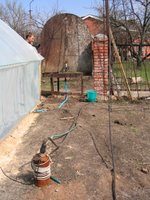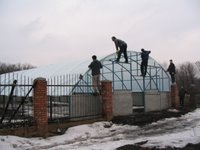Today is “Easter Monday” in Ukraine, following the Eastern Orthodox church calendar. Following are a few Ukrainian Easter celebration traditions. The majority of people in Ukraine are Ukrainian or Russian Orthodox. Protestants make up a small minority, and it’s interesting to see how the different traditions of celebration intermingle.
Chisti Chetvirg – “Clean Thursday.” In Ukraine, the Thursday before Easter weekend is a day of cleaning. Orthodox tradition says that you should get up before the sun rises, and thoroughly wash yourself. Then you’re supposed to clean your apartment and get ready for the holiday, since no one should once Easter weekend has begun. Cleaning apartments and washing yourself probably stems from spiritual cleansing that also takes place in preparation for Easter. Some people fast on this day as well. Even though lots of people aren’t religious, the cleaning habits have infiltrated the culture enough that on Thursday, people everywhere could be seen washing windows, sweeping sidewalks and streets, and painting. In the Baptist tradition (the church we attend is Baptist-affiliated), churches have communion services on Thursday evening.
Easter – There are two times a year when the Orthodox church has all night services – Christmas Eve, and Easter Eve. People gather Saturday night and don’t leave until Sunday morning. (And they stand all night – no benches in Orthodox churches!) They bring with them wicker baskets of food – bread, sausage, cheese, even vodka – to be blessed with holy water by the priest. Sunday morning we saw many basket-toting churchgoers, heading home for an Easter feast of “holy” food. Protestant churches have a regular Sunday morning service (maybe a bit longer than usual) and everyone greets each other, saying, “Christ is Risen” “He is risen indeed.”
Paska – This is Easter Bread, and also the translation of “Easter.” It is a sweet raisin bread, baked in a can, so it’s tall and skinny with a round top. The top of the loaf is frosted with white icing and colored sprinkles. About every store/kiosk that sells food has paska for sale on Easter weekend. Some say the top of the loaf symbolizes the cupolas of Orthodox churches (though I don't think the Protestants would say that), others say paska bread originated with ancient Slavic pagans. Wherever it came from, it's tasty.
People also decorate eggs, but more popular than colored dye are little plastic sheaths with colorful designs of flowers, birds and Orthodox churches that mimic real decorated Ukrainian eggs.
Laura








